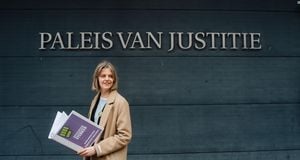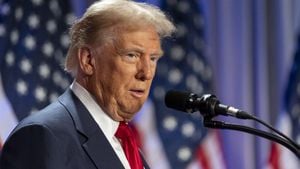Kolkata is once again at the center of controversy as the Enforcement Directorate (ED) ramps up its investigation against suspected lottery fraud. The dubious lottery company, Future Gaming and Hotel Services Private Limited, is under fire for allegedly manipulating its operations to evade tax and engage in money laundering. The investigation has revealed alarming links between the company’s activities and influential figures within the state, leading to serious allegations against both the company and individuals involved.
This scandal has drawn attention not only for the large sums of money seemingly involved but also for the targeting of vulnerable populations who have lost their hard-earned money due to deceptive practices. The ED's probe has recently uncovered over Rs 12.41 crore during raids conducted across six states, with Kolkata being the epicenter of the cash recoveries. The agency's efforts have primarily focused on the company's management, suspected of establishing this dubious lottery scheme since at least 2012.
During the recent searches, the ED recovered Rs 3 crore from the residence-cum-office of one of the agents located at Lake Market, South Kolkata. This is indicative of the financial juggernaut the lottery scheme appears to be, capitalizing on the involvement of complex fraudulent transactions often disguised as legitimate business activities.
For years, this lottery entity has faced scrutiny. The Income Tax Department first raised alarms about the company’s tax evasion activities back in 2012 when one of its directors was arrested in Chennai. Following this, the company underwent major raids by the IT Department, which confiscated over Rs 70 crore. Despite this setback, operations resumed aggressively by the end of 2017, raising more red flags.
Sources indicate the company's business model hinged largely on lottery tickets with minimal face value—Rs 6 per ticket—wherein most prize amounts fell below Rs 10,000, making them non-taxable. This clever structuring has allowed the company to profit substantially, providing little revenue to the state authorities and exploiting legal loopholes.
Suvendu Adhikari, the Leader of Opposition in West Bengal's Assembly, has long alleged widespread malpractice surrounding these lottery operations, claiming significant losses for many poor rural individuals. His allegations suggest deep-rooted connections between the lottery operations and key members of the ruling Trinamool Congress, raising concerns about the barriers to accountability faced by the investigation efforts.
The financial intricacies of this case become more alarming when delving deep. The ED claims to have discovered extensive investments made by the company and key players involved, including funds being funneled abroad through hawala channels and investments made undisclosed properties both nationally and internationally. With investigations spanning states like Tamil Nadu, Karnataka, and Uttar Pradesh, it's clear this situation has far-reaching effects.
Hackles are being raised over how draw outcomes, particularly those involving large prizes, seemed to revolve overly around the same regions or even individual families winning major jackpots rapidly. Such patterns trigger serious questions about fairness within these schemes. Investigators are particularly concerned about reports highlighting instances of family members, such as spouses, winning massive prizes within short spans, raising concerns about the legitimacy of the draw processes.
The company seems to have devised its lottery schemes to maximize profit strictly toward its own interests—with no substantial consideration for customer rights. It appears standard operational transparency practices were sidestepped entirely, with neither adequate records kept on sold or unsold tickets nor official records on prize winners. All of this converges around the notion of deliberate deception aimed at increasing the revenue of the company at the cost of ordinary people.
Recent actions from the ED have included extensive searches at 22 locations, including lottery printing presses, where substantial amounts of cash and various incriminatory documents have been retrieved. The agency has been resolute about pursuing claims of substantial profits having been siphoned off illegally, accruing through their supposedly legitimate lottery operations. This is precisely where the allegations gain even more traction, as tax evasion is just one facet of this tangled web.
The investigation’s depth has also unearthed draws being drawn on unsold tickets, duping honest participants under the guise of winning opportunities. Newspaper advertisements have reportedly featured fake winners, preying on the vulnerability of potential customers and creating false aspirational narratives about instant wealth. The trend of exploiting the dreams of less privileged citizens only emphasizes the predator-prey dynamic inherent in this operation.
It’s evident the ED's investigation isn't merely about tax evasion but unearthing potentially vast networks of corruption. Multiple FIRs, including those originating from the Meghalaya Police and encompassing wider investigations facilitated by the CBI, bear testimony to the expansive nature of the inquiry.
With stakes this high, many hope the investigation will bring accountability to the entities profiting from these underhanded operations. Local survivors of these scams have started voicing their concern, with many saying they just wanted to try their luck, unaware of the systemic exploitation embedded within these supposedly innocent lottery schemes. One has to wonder—how many lives have been impacted by such predatory practices?
While the inquiry continues, the fallout from this scam has raised questions about the integrity of gambling practices across India, particularly those which target vulnerable communities. With high levels of economic inequality present, the allure of lotteries remains significant, making it even more pressing to regulate and safeguard consumers from impending frauds. This situation is far from over, and as the investigators dig deep, the layers of deception appear to be more extensive than anyone could have anticipated.



